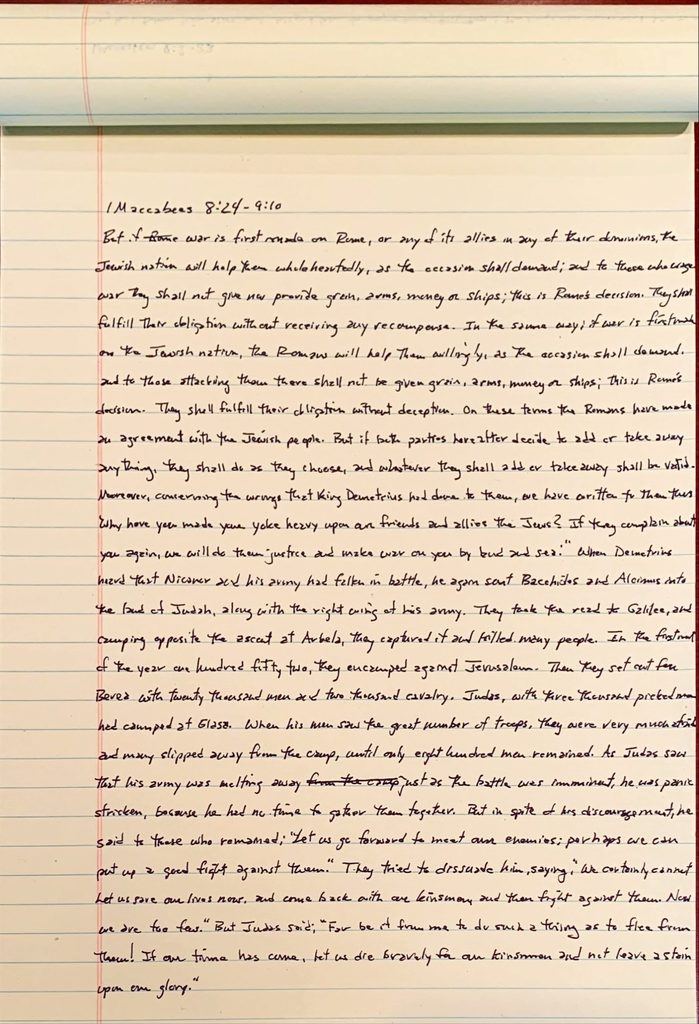Maccabeus Political Warrior

Synopsis 1Maccabees 8:24-9:10 1/29/2021
Upon Maccabeus’ request, Rome sent the terms of a their treaty to Jerusalem. To show their permanence, they sent them on bronze tablets. Additionally, the Roman senate warned King Demetrius in a letter. Specifically, they told the king to leave the Jews alone.
However, all of this took a long time. So, neither the treaty nor the warning arrived promptly.
Meanwhile, upon learning that Judas Maccabeus had defeated Nicanor, Demetrius tried again. This time the king sent Bacchides and Alcimus to invade Judea. Since he was unaware of Rome’s intervention, his generals prepared for battle with a very large army.
When the Jewish soldiers saw the size of the enemy army, two-thirds deserted. This left Judas with only eight hundred men. The enemy had twenty-two thousand soldiers.
In the past, when faced with overwhelming numbers, Judas often chose to flee and reposition his forces. But, although his brothers encouraged him to flee, this time Judas refused.
Maccabeus Desire for Political Solution
Judas exhausted himself. Since before the time his father died, Maccabeus was a priest-warrior. He was totally committed to fight for the right to worship God in the temple. And he fought heroically to accomplish this end.
But his enemies proved intractable. He had fought and defeated the armies of three different Syrian kings. And none of them was willing to give the Jews unfettered control over their worship.
So, at this point in history, he just wanted the fighting to be over. After years of battle, he looked for a Roman alliance to solve his problems. Unfortunately for him, the help didn’t arrive in time. But even if it had, it wouldn’t have solved his problem forever. His political fight could not address the root of his deepest problem.
In this final battle, Judas chose to stand and fight. But his final choice was born less out of faith and more out of exhaustion. He wanted so badly for the fight to be over that he sought a solution through political alliance. However, if Rome couldn’t bring him political salvation, his choice was to embrace a near suicidal assault that he would have rejected just three years before.
Christian Political Warrior
The call of Christ isn’t essentially political. Of course, that’s not to say that Christians shouldn’t participate in whatever the political process might be in the social community where they live.
But politics simply isn’t the fundamental reason, or the most appropriate venue, for my expression as a Christian. And very often, overidentification with some particular political agenda ends up being essentially contrary to the call of Christ, no matter with what good intentions it began.
It’s a struggle because I hate the injustice that I see in the world. And God has certainly called me to seek first His kingdom and His righteousness. But too often my desire to participate in political process is really no more than the desire to impose my perspective on others. And this is what makes it essentially contrary to my calling.
Can I really believe that the Kingdom of Heaven will come because I force it into existence over the political objections of others? Like Peter and the apostles, I have to give up this simple-minded misunderstanding of my calling. And like Paul, I need to embrace the idea of living simply and quietly, allowing the manner of my life to challenge the beliefs of others.
So, here’s my prayer: May the good that I do, be the good that I do. And may I leave it to God to use the goodness manifest through me to persuade others to a higher possibility.
“Jesus answered, “My kingdom does not belong to this world. If my kingdom did belong to this world, my attendants [would] be fighting to keep me from being handed over to the Jews. But as it is, my kingdom is not here.” John 18:36

